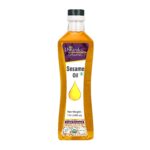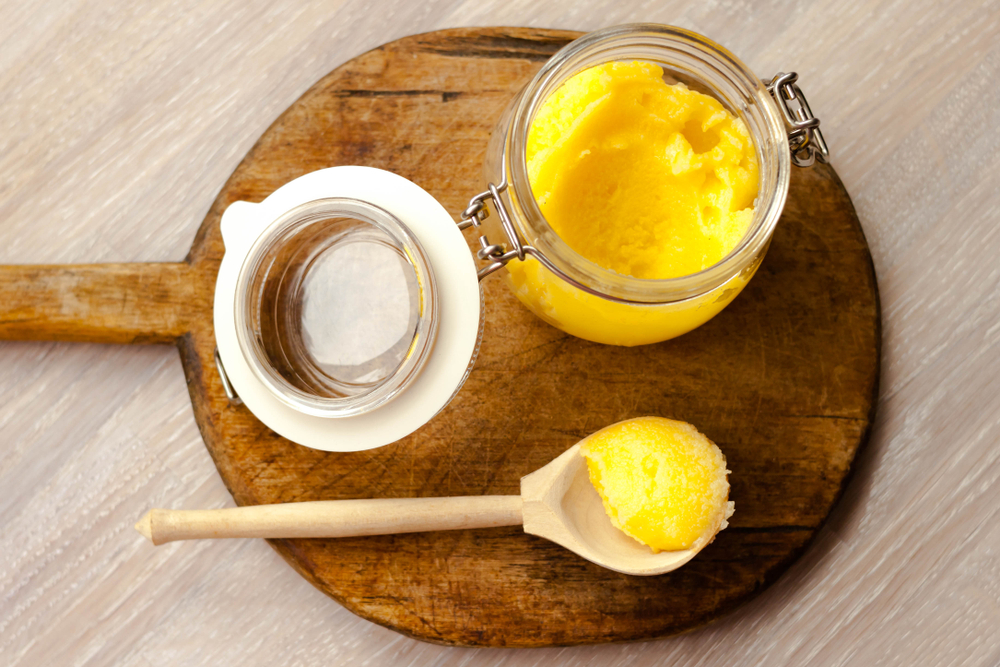Ghee is a type of clarified butter that is made by heating butter, then allowing the liquid and milk portion to separate from the fat. Ghee can be used as a replacement for regular butter or cooking oil in almost any recipe, except for baking. In most cases, many people choose regular butter. For this reason, a frequently asked question people have about it is: Does ghee go bad?
Ghee doesn’t go bad quickly, but it will not last forever. An unopened jar of ghee can last up to 9 months past the best-by date. Once opened, it can last up to 6 months at room temperature or up to one year in the refrigerator. If you notice a change in smell or if mold appears, discard it immediately.
In this article, we will discuss whether ghee goes bad over time, as well as how to properly store ghee. We will also highlight a few alternatives to ghee. Let’s dig in!
Contents
Does Ghee Go Bad Over Time?
Although ghee does not go bad quickly, it can go bad over time if stored improperly. To maintain its quality for a longer time, keep it at room temperature until opened. Once opened, it is best to store it in the refrigerator. Ghee does not have to be refrigerated after opening, but doing so will maintain its quality for a longer period of time.
If you plan to use the entire contents of the jar in a short period of time, the storage method will not make a big difference. However, some people only need a small amount for a recipe and then store the rest away in the pantry or refrigerator. Therefore, if you are not sure when you will use it again, it is best to store it in the refrigerator to maintain its quality. If you notice a change in color, smell or if mold appears, it should not be consumed and discarded immediately.
Does Homemade Ghee Go Bad?
As it is with store-bought ghee, homemade ghee can go bad if it is not stored properly. Homemade ghee should always be stored in the refrigerator, especially if you plan on keeping it for over 3 months. As it is with store-bought ghee, homemade ghee should be used within one year in order to experience the full quality and flavor.
How Can You Tell If Ghee Has Gone Bad?
There are a couple of ways for you to tell if ghee has gone bad.
First, if it smells off, do not consume and discard immediately. Rancid ghee has a distinct odor that is very different from the usual sweet, milky one. If it does not pass the smell test, get rid of it.
Next, if there is any discoloration, do not consume and discard immediately. Discoloration is usually the result of the lid not being sealed tightly enough. To prevent this from happening, make sure the lid is tightly sealed before storing away for next time.
Lastly, if mold appears, do not consume and discard immediately. Mold, like discoloration, usually happens when the lid has not been sealed tightly enough. Tightly sealing the lid each time you close it is imperative to maintaining the quality of ghee.
Most jars of ghee come with a best-by date, not a use-by date. The best-by date is not necessarily the expiration date. It simply means the quality will stay at its best until that date. However, it will usually keep for much longer if stored properly.
How To Properly Store Ghee?
Ghee should be stored at room temperature if it is unopened. If it is opened, it can stay at room temperature, but it is best to keep it in the refrigerator to maintain its quality for longer. At room temperature, ghee can last up to 9 months without concern. In the refrigerator, ghee can last for about one year without concern. After one year, the smell and appearance should be examined before consuming.
How To Store Ghee
- Find a dark place away from sunlight such as the pantry or kitchen cabinet. Sunlight will cause ghee to oxidize and lose its nourishing properties.
- Make sure there is a constant temperature. This means keeping it away from the stove and dishwasher, and do not keep moving it from the pantry to the refrigerator. Pick one place to store your ghee and make that its home.
- Keep it in its original container. This will prevent any cross-contamination from other containers.
- Once opened, make sure the lid is tightly sealed and the container is not damaged before storing it away for next time.
Does Ghee Go Bad After Opening?
Once opened, ghee can last up to 9 months in the pantry or up to one year in the refrigerator. In time, it may start to develop changes in color or smell. If that happens, it should not be consumed and discarded immediately. In order to experience the full flavor and quality of ghee, it is best to consume it by the best-by date on the label and follow proper storage guidelines.
If unopened, ghee can last about 9 months to a year if stored properly. Once again, proper storage is key when it comes to maintaining the quality of ghee.
Can You Get Sick From Old Ghee?
Ghee typically will not make you sick if it has been stored properly, even if it is past the best-by date. The only time you should be concerned about getting sick from ghee is if mold developed. Mold can cause a slew of problems such as allergic reactions, respiratory problems, nausea, vomiting and diarrhea. In some cases, mold can produce toxic chemicals called mycotoxins that can cause disease and, in rare cases, death depending on the individual and the amount consumed.
Alternatives To Ghee
Ghee is a great substitute for regular butter in almost any recipe, except baking. It tastes just like regular butter, but with a slightly roasted, nutty background. Although nothing can replace the unique flavor of ghee, there are a few alternatives you can try instead that may offer a similar flavor profile.
Farm To Market Expeller-Pressed 100% Pure Sunflower Oil
 If you are looking for an easy, inexpensive, and highly accessible substitute for ghee, you have to try this sunflower oil. It is made with high-quality ingredients, and contains healthy fats and antioxidants. It is great for all cooking, but it is especially good for deep-frying because it has a high smoke point like ghee.
If you are looking for an easy, inexpensive, and highly accessible substitute for ghee, you have to try this sunflower oil. It is made with high-quality ingredients, and contains healthy fats and antioxidants. It is great for all cooking, but it is especially good for deep-frying because it has a high smoke point like ghee.
Farm To Market Expeller-Pressed 100% Pure Canola Oil
 Canola oil is another great substitute for ghee. Like sunflower oil and ghee, canola oil has a high smoke point making it great for deep-frying. However, unlike ghee, canola oil does not have much of a flavor, so you do not have to worry about it altering the taste of your recipe. This brand of canola oil, in particular, is made with high-quality ingredients and is rich in antioxidants. Therefore, you can feel good using this oil in all your favorite recipes.
Canola oil is another great substitute for ghee. Like sunflower oil and ghee, canola oil has a high smoke point making it great for deep-frying. However, unlike ghee, canola oil does not have much of a flavor, so you do not have to worry about it altering the taste of your recipe. This brand of canola oil, in particular, is made with high-quality ingredients and is rich in antioxidants. Therefore, you can feel good using this oil in all your favorite recipes.
Dwaraka Organic Cold-Pressed Sesame Oil
 This sesame oil is cold-pressed to ensure the original flavor and nutritional value is retained. It is extracted from organic sesame seeds and has been proven to be highly beneficial for the skin. It has a strong, nutty flavor like ghee, which makes it an ideal substitute. Use it for sautéing, stir-frying, tempering, in salad dressings and so much more.
This sesame oil is cold-pressed to ensure the original flavor and nutritional value is retained. It is extracted from organic sesame seeds and has been proven to be highly beneficial for the skin. It has a strong, nutty flavor like ghee, which makes it an ideal substitute. Use it for sautéing, stir-frying, tempering, in salad dressings and so much more.
Viva Naturals Organic Coconut Oil
 Made from fresh, organic coconuts, this coconut oil delivers a rich, naturally delicious flavor. It is perfect for cooking, frying or even spreading on muffins or toast for a healthy and delicious alternative to butter. Coconut oil tends to be on the expensive side, so it might not be ideal for all budgets. But, in terms of flavor, it is a great alternative to ghee.
Made from fresh, organic coconuts, this coconut oil delivers a rich, naturally delicious flavor. It is perfect for cooking, frying or even spreading on muffins or toast for a healthy and delicious alternative to butter. Coconut oil tends to be on the expensive side, so it might not be ideal for all budgets. But, in terms of flavor, it is a great alternative to ghee.
Lakeshore Irish Cold-Pressed Extra Virgin Rapeseed Oil
 This oil is rich in omega-3,6,9 and vitamin E. It is highly versatile and works well in most dishes. It has a nutty aftertaste, but is relatively mild and easily overpowered by the other flavors in your dish. So, even if you do not like the nutty taste of ghee, you might like this.
This oil is rich in omega-3,6,9 and vitamin E. It is highly versatile and works well in most dishes. It has a nutty aftertaste, but is relatively mild and easily overpowered by the other flavors in your dish. So, even if you do not like the nutty taste of ghee, you might like this.
Related Questions
Is Ghee Dairy-Free?
Ghee is not dairy-free. However, it might still be a good option for those who are lactose intolerant. That is because it contains extremely low levels of lactose and casein, a milk protein. So, if you are lactose intolerant, try using ghee in your next recipe. I think you will be pleasantly surprised.
Is Ghee Healthy?
Ghee is an excellent source of vitamins, antioxidants and healthy fats. Although it should still be consumed in moderation, studies have shown that eating fatty foods such as ghee can help the body absorb essential vitamins and minerals. Try cooking healthy foods and vegetables with ghee to help your body absorb more nutrients.
Is Ghee Inflammatory?
No. In fact, ghee has anti-inflammatory properties. It can be used to treat burns and swelling. Butyrate is a type of fatty acid found in ghee that has been linked to an immune system response linked to inflammation.
